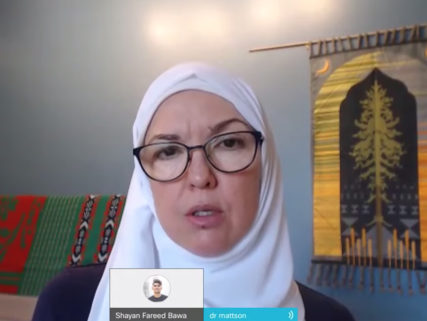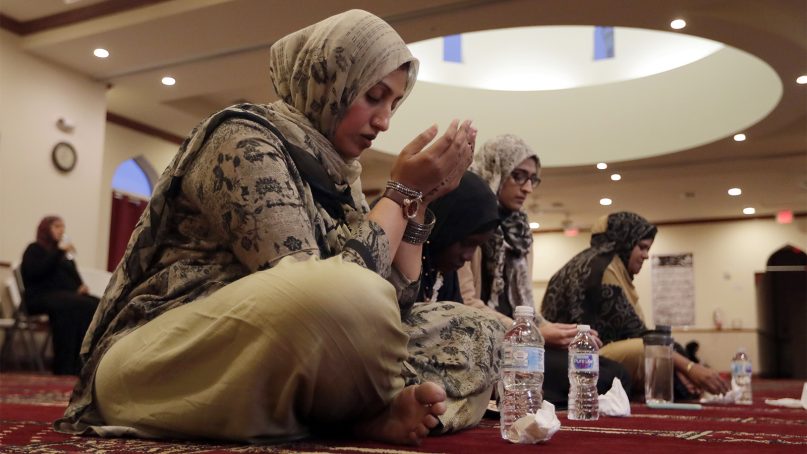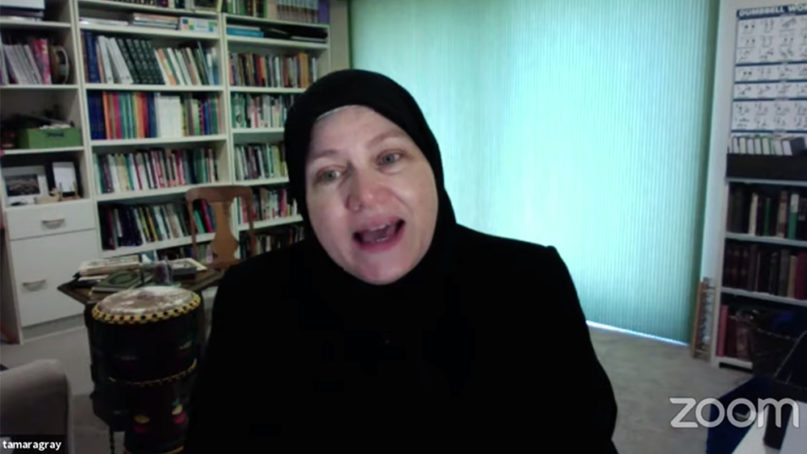(RNS) — Every Friday afternoon since the COVID-19 shutdown began, the Islamic Society of North America (ISNA) has livestreamed “Friday Reflections” on its YouTube channel in lieu of the weekly congregational sermon many Muslims attend. Viewers watch the lecture and pray at home — not quite a normal Friday prayer, but what is normal these days?
Despite President Trump’s claim that mosques would get special treatment during this crisis, it’s no surprise that COVID-19 has shifted Muslim religious life almost entirely online. What is surprising about ISNA’s Friday Reflections is that so far three of ISNA’s six preachers — Ingrid Mattson, Dalia Mogahed and Tamara Gray — are women.
This may point to a new trend. As services of all kinds have gone virtual, mosques are regularly inviting women to offer religious lectures to mixed-gender congregations. Sheltering in place, in fact, may be giving American Muslims an opportunity to reshape our community spaces.
Mosques in the U.S., as in much of the world, are highly gendered. Most mainstream Muslims agree that mixed-gender congregational prayers should be led by a man. Two-thirds of mosques segregate their prayer spaces, often with a physical barrier, and only a little over half have women on their governing boards.
RELATED: How Hind Makki is changing the conversation around women’s inclusion in mosques

Dr. Ingrid Mattson speaks for “Friday Reflections” on the Islamic Society of North America (ISNA) YouTube channel on March 27, 2020. Video screengrab
Many times, women in the mosque are already experiencing prayers “virtually,” with the imam appearing over a television or audio feed in the women’s space. Not all mosques are equipped with the technology where women actually see and hear the imam — and if they are equipped, often they break down in the middle of prayer, and women are left to guess what is going on.
In the United States, where Muslim women are, on the whole, more educated than their male counterparts, many mosques do invite women as secular experts — in the fields of mental health or civil rights, for example.
Both ISNA and the Institute for Social Policy and Understanding, a think tank that analyzes trends in American Muslim communities, have long recommended more inclusion of women in leadership and programming within American mosques. ISNA, which was the first Muslim organization of its kind globally to elect a woman president — the very Mattson who gave the first Friday reflection a month ago — issued a statement in 2015 advocating for women’s full inclusion in all U.S. mosques and launched a Welcoming Mosques Taskforce. ISPU, where Mogahed is the director of research, commissioned a ground-breaking study, Reimagining Muslim Spaces, which recommends mosques create more women-led programming and promote women’s full inclusion in elected boards.
Some American mosques have had women teach in mixed-gender contexts for years. At most African American mosques, which do not typically segregate their prayer spaces, women have led ta’leem, or religious education, sessions to mixed-gender audiences for decades. In the last few years, a handful of mosques across the country have hired female ustadhas, or scholars in residence, who preach, teach, and offer spiritual guidance to their congregations. Since 2018, for example, Fatima Lette has been the ustadha at the Roswell Community Masjid in Georgia.
The key here is that, with congregational prayer cancelled, there is no worry that women are leading mixed-gender communal prayers, a function still reserved for men. Every Ramadan at the Islamic Center of Southern California, which has had women serving on its board since the 1950s, women scholars offer Quranic commentary during special nightly congregational prayers. This year, Edina Lekovic will be the featured speaker for the Night of Power, the holiest night of the Islamic calendar that comes at the end of the sacred month of fasting and prayer. This first, she explained, “is a first for ICSC, available only because it’s virtual and does not include leading prayers.”

Women pray at the Islamic Center of Greater Miami, on May 8, 2019, in Miami Gardens, Florida. (AP Photo/Lynne Sladky)
Sometimes the shift is less deliberate. After Jaye Starr, a Muslim hospital chaplain, was asked to provide resources for a livestream session on death at her mosque, she was subsequently asked to join a follow-up panel that included some men. “I think the board member asking perhaps forgot that women don’t speak in front of mixed-gender audiences at our mosque (still!),” Starr wrote to me. But a few days later, Starr was happily surprised to receive an official request to address the session.
These stories suggest that performing our rituals together from home has allowed Muslims with privilege to experience solidarity with those who have often not felt included: women, converts and families with special needs members. After the pandemic is over, mosques may and should be inspired to structure programming that includes these groups more fully.
Doing so will inevitably deepen women’s faith. According to a study commissioned by ISPU, American Muslim women say that their best mosque experiences have come when they have direct visual access to the imam and when women have representation on the mosque board.
I urge mosques to continue this trend to invite women scholars, speakers and preachers offline, as part of a reimagined, post-COVID-19 world. Mosques should hire female scholars in residence and fully include women into their leadership structures. We’ve grieved as the disease has shuttered mosque doors and shifted our programming to the virtual world. But we must use this time to bring in those whose voices have traditionally been marginalized, overlooked and ignored.
(Hind Makki, an interfaith and anti-racism educator, is the founder and curator of Side Entrance, an award-winning website documenting women’s prayer experiences in mosques and served on the Islamic Society of North America’s Mosque Inclusion Taskforce and was an adviser to the ISPU project Reimagining Muslim Spaces, consulting with American mosques on gender, economic and convert diversity. The views expressed in this commentary do not necessarily reflect those of Religion News Service.)





